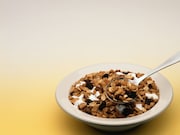Reduction in risk for range of critical outcomes greatest for daily dietary fiber intake of 25 to 29 g
FRIDAY, Jan. 11, 2019 (HealthDay News) — High intake of fiber is associated with a reduced risk for several noncommunicable diseases (NCDs), according to research published online Jan. 10 in the The Lancet.
Andrew Reynolds, Ph.D., from the University of Otago in New Zealand, and colleagues conducted a series of systematic reviews and meta-analyses of prospective studies and randomized trials that evaluated indicators of carbohydrate quality and NCD incidence, mortality, and risk factors. Data were included for nearly 135 million person-years from 185 prospective studies and 4,635 adults from 58 clinical trials.
The researchers found that compared with the lowest consumers, the highest dietary fiber consumers had a 15 to 30 percent decrease in all-cause and cardiovascular-related mortality as well as a decrease in incidence of coronary heart disease, stroke incidence and mortality, type 2 diabetes, and colorectal cancer. Clinical trials showed significantly lower body weight, systolic blood pressure, and total cholesterol with higher versus lower intakes of dietary fiber. With a daily intake of dietary fiber of 25 to 29 g, the risk reduction associated with a range of critical outcomes was greatest. Higher intakes of dietary fiber could confer even greater benefit to protect against cardiovascular diseases, type 2 diabetes, and colorectal and breast cancer, according to the researchers. The findings for whole grain intake were similar.
“Our findings provide convincing evidence for nutrition guidelines to focus on increasing dietary fiber and on replacing refined grains with whole grains,” the authors write. “This reduces incidence risk and mortality from a broad range of important diseases.”
Copyright © 2019 HealthDay. All rights reserved.








